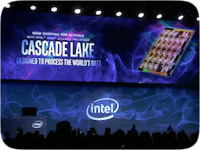At a press event during the 2019 Consumer Electronics Show (CES), Intel provided more insight into its silicon roadmap, which will finally include the official launch of 10 nanometer-based (10nm) processors.
“We wouldn’t ordinarily come to the Consumer Electronics Show to talk about the Data Center, but we’ve come to recognize that the data center is a quiet player behind the scenes that creates, moves and stores data for all us,” Intel Data Center Group Executive Vice President Navin Shenoy said during the press conference.![]()
Ice Lake
Among the 10nm silicon innovations announced by Intel is the Ice Lake processor, which will power the future generation of Intel Xeon Scalable server processors. 10nm Ice Lake will also form the core of Intel’s next generation of client silicon for PCs as well.
For mobile devices, the 10nm technology has been dubbed “Lakefield” and is integrated with low-power management capabilities. Intel is also bringing 10nm to networking to help enable 5G wireless deployments with the Snow Ridge variant of its silicon.
“We’re making very good progress on all of the products that will leverage the latest silicon process technology based on 10nm from Intel,” Shenoy said.
Shenoy said the Ice Lake Intel Xeon will not be generally available until 2020, and it will follow Cascade Lake, which has now just started to ship.
Cascade Lake
Intel also announced that it is now shipping Cascade Lake Intel Xeon Scalable server processors. Cascade Lake was officially announced in November 2018, with the Xeon E-2100 processors for both high and low end server platforms.
At the top end of the Cascade Lake silicon family is a 48-core CPU system that can support up to 12xDDR4 memory channels per socket.
Cascade Lake also integrates Artificial Intelligence (AI) capabilities, including the Intel Deep Learning Boost that accelerates AI workloads.
Cascade Lake also integrates Optane persistent memory, which provides faster performance than solid state storage drives, while applications recognize the technology as a large pool of memory. Shenoy explained that with persistent memory, data is retained even when the power is shut off.
“Cascade Lake has been designed to process the world’s data,” Shenoy said.
Intel Nervana
While Intel Xeon Scalable processors are intended for general purpose compute, Intel has recognized there is also a need for a purpose-built processor for Artificial Intelligence (AI) workloads for inference.
At CES, Intel announced the Intel Nervana Neural Network Processor for Inference, or NNP-I. Inference refers to the machine learning process of inferring context after an AI model has already been trained.
Shenoy expects NNP-I will be valuable for a variety of AI inference workloads, including image recognition and image classification.
Sean Michael Kerner is a senior editor at ServerWatch and InternetNews.com. Follow him on Twitter @TechJournalist

